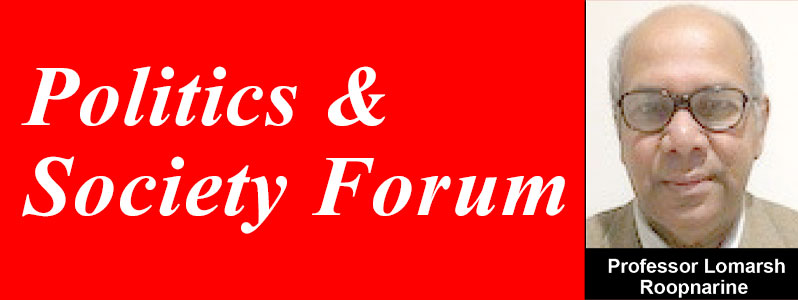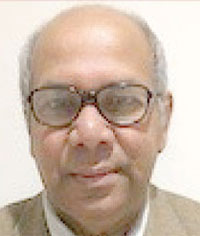ON page 51 in his book, Guyana’s Great Economic Downswing, 1977-1999, Socio-economic impact of Co-operative Socialism, published by Xlibris in 2020, Dr. Ramesh Gampat declares that “Convenient historical forgetting and convenient historical remembering are part and parcel of tribal politics, which has poisoned and corrupted the average Guyanese mind.” On page 57, Dr. Gampat elaborates further, “If there is one axiom of political tribalism in Guyana, it is that Africans will do anything to get into power and will not surrender power easily even if they lose fairly at the polls.”
I pulled the above quotes from Gampat’s book to assist me to analyze what transpired after the March 2, 2020, general elections in Guyana. I would modify, however, “Africans will do anything…” to APNU/AFC Coalition leaders and supporters would do anything to grab power. I have seen more Indian tribalism in the AFC than in any other political party in Guyana. I would rather see M. Nagamootoo and K. Ramjattan riding bicycles around their villages rather than politicking for votes. That said, it is common knowledge that attempts were made to rig the March 2, 2020, general elections to favour the APNU/AFC Coalition, a claim substantiated and supported by local, regional, and international observers as well as social media footage. Moreover, the rigging attempt is at least suspect by the fact that the chief and returning election officers, the chairwoman, and an agent of the APNU/AFC Coalition, have been charged with various offences stemming from their behavior during the finalisation of the general elections. Of course, these are charges, not guilty verdicts.
It is common knowledge also that some “influential” individuals and some sections of Guyana believe that the attempt to rig the March 2, 2020, general elections to favour the APNU/AFC Coalition never happened. They have put forward a narrative that the general election is flawed insofar as in conflict with their findings of what constitutes a “valid vote.” There is a pending election petition that demonstrates that the position of the Coalition and its supporters is no argle-bargle matter. This argument, even from a layman’s perspective, is not backed by sound evidence to change the outcome of the election results. The argument is more deterministic, which usurps the possibility of any alternative views.
The question before us is, why after more than two decades of “normal” general elections, we have returned to both main political parties claiming victory at the polls. What makes this question worth exploring is that we have skipped over the gains made in conducting “reliable” elections in the past two decades and returned to the period of blatant rigging of elections during the three decades of PNC leadership in Guyana. We have backpedaled in this regard. If we agree that the conditions of politics (marginalization and exclusion) rather than the politics of conditions (competition, triumphalism, and zero-sum narratives) have led to electoral rigging, then we must face and address the following questions and observations. Why is it that the PNC, and later APNU/AFC coalition (28 + 5 = 33 years) have failed to deliver to its supporting base when in power? How come the leadership has not responded to its own charges of marginalization in its electoral base? We do not need to conduct research or interrogate analysts to know that the lives of African politicians have been upgraded to elite status while the lives of the African masses have been downgraded or remained economically stagnant. This inequitable situation might explain why the Coalition was not confident with the attitudes and allegiances of voters to retain power, forcing it to look for alternative plans and paths of survival. What this meant for the APNU/AFC Coalition was going back to the days when the rigging of elections was a normalized process. I am convinced that this process since March 2, 2020, has been transformed from the “rigoton” days of the 1970s and 1980s to GECOM school of electoral rigging, supported by rhizomatic roots and routes.
The challenge for the PPP administration is how to reform this GECOM school of electoral rigging with a reverse Midas touch. I am not referring to legislative reforms. That is a sine qua non. I am referring to the trappings of some who are not only uninterested in any reform but are also convinced that “unfinished business” at GECOM must be completed before or during the next election. Guyana’s Election Commission has become diseased, so much so that any real reform will require two election voting cycles (10 years) to flush out the nadir of ignominy to restore credibility. Side-stepping this requirement will result in chasing a will-o’-the-wisp dream. The good thing, however, is that the current situation at GECOM provides a fertile ground for collaboration among political parties and stakeholders to establish an independent management body, including a new system for judicial resolution of election disputes. Dr. Gampat, on pages 532 and 533, declares that Guyana “simply lacks the political will for change largely because its leaders are captive to tribal interest and tribal politics.” He adds that “we are defined not by conditions in which find ourselves, but in how we choose to respond” to these conditions (lomarsh.roopnarine@jsums.edu).




.png)









